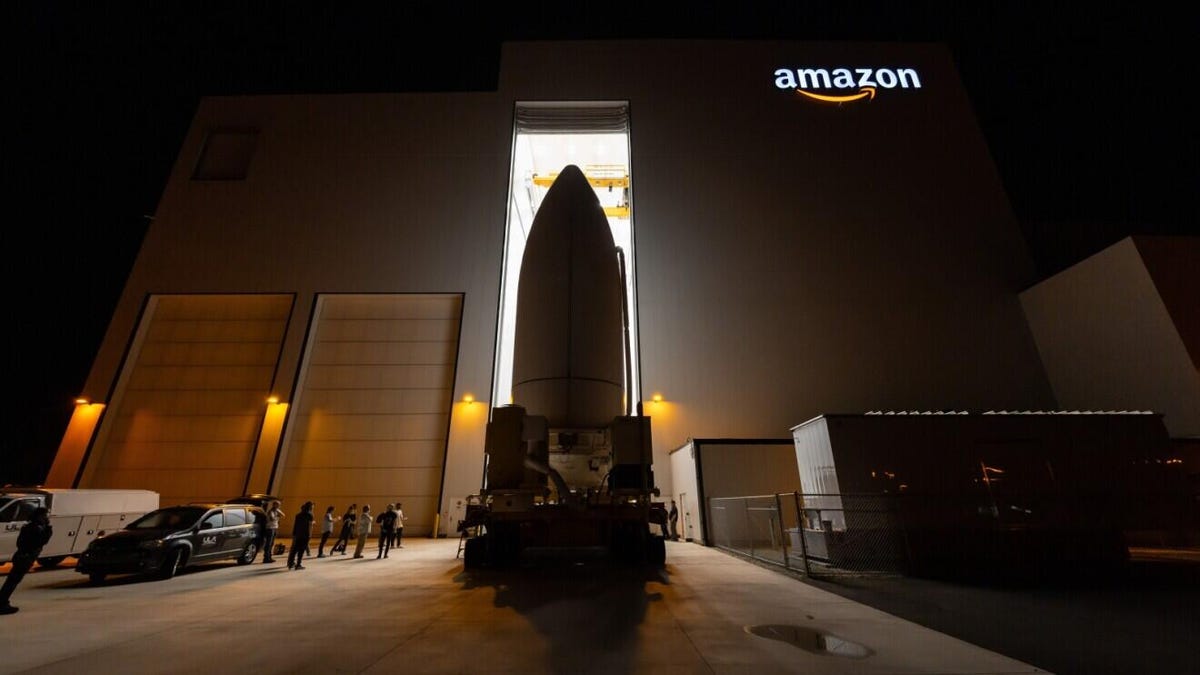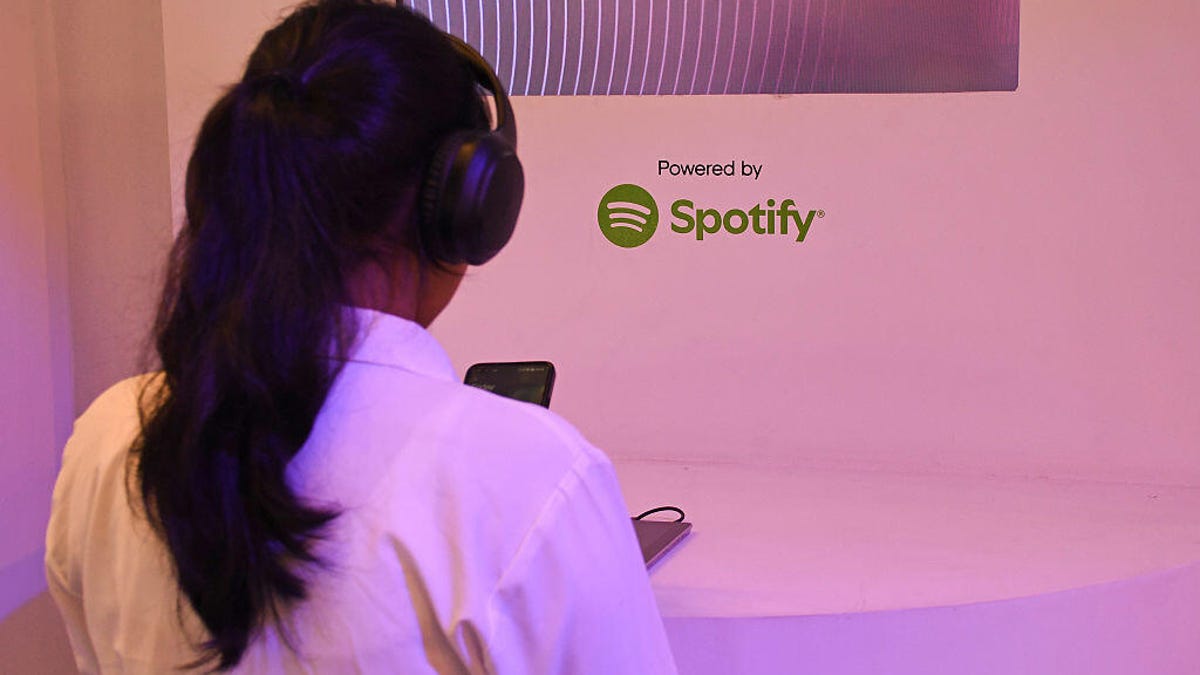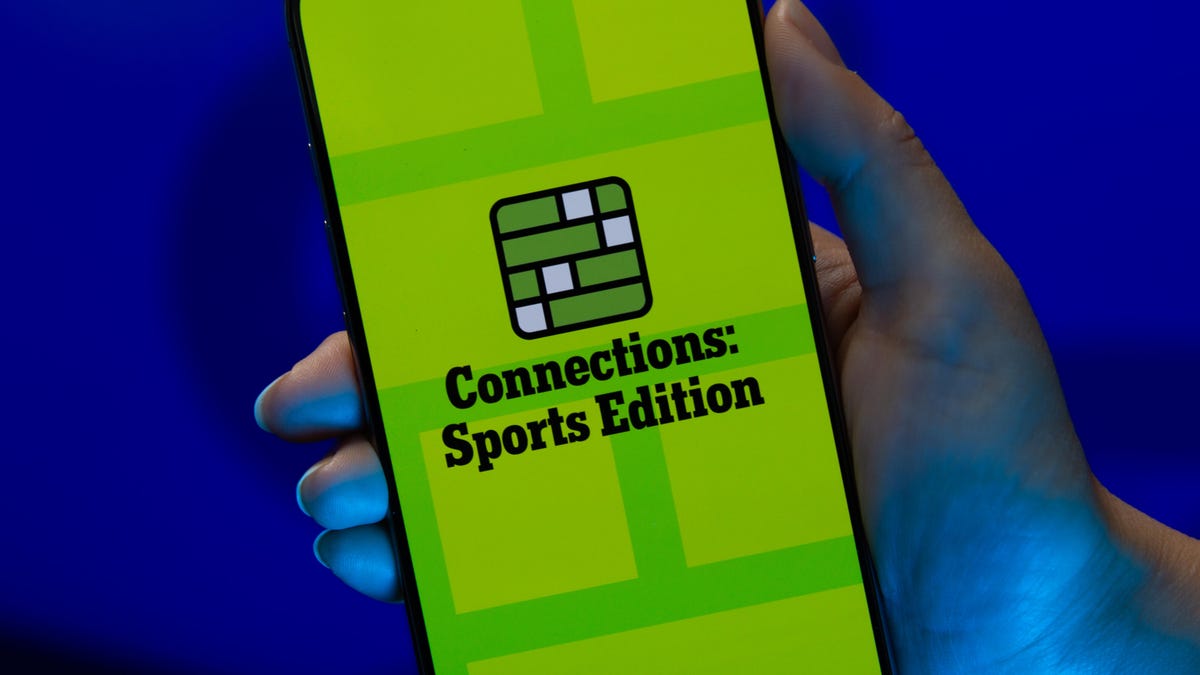Technologies
Amazon’s Starlink Satellite Service Rival Has a Rocket Launch Set for Next Week
The first planned launch was scrapped due to the weather, but Project Kuiper has a new date.

Amazon is planning to launch 27 low-Earth orbit satellites early next week as part of Project Kuiper to provide satellite broadband. The date is set for Monday, April 28, between 7 p.m. and 9 p.m. ET (4 and 6 p.m. PT), barring weather or other factors impacting launch.
Poor weather forced Amazon to abandon its original rocket launch date of April 9. «Weather is observed and forecast NO GO for liftoff within the remaining launch window at Cape Canaveral this evening,» United Launch Alliance said at the time. «The stubborn cumulus clouds and persistent winds make liftoff not possible within the available window.»
The launch mission, KA-01 or Kuiper Atlas 1, will be on a United Launch Alliance Atlas V rocket and will take place at Cape Canaveral Space Force Station. You’ll be able to watch the rocket launch live on the project’s mission page or on YouTube.
It’ll be a big step forward for the project, which Amazon announced in 2019 with promises of a $10 billion investment. Now, the company is poised to enter the race to provide satellite internet service, a space currently dominated by SpaceX’s Starlink, which has about 7,000 satellites. Amazon’s plans call for 3,200 satellites to be deployed over 80 launches. The company intends to provide internet service with this technology later this year.
More competition will improve satellite internet services
The literal space race, which includes Starlink, Amazon and other companies such as Viasat, Hughesnet, Eutelsat and China’s SpaceSail, could mean more internet service availability in far-flung and rural areas with limited broadband options. Though Starlink is the leader in space, some of these other companies are continuing to launch satellites and working to deploy high-speed internet in more markets, such as Brazil. With more players in the market, that could mean faster and cheaper internet in more areas, although whether that actually bears out for consumers remains to be seen.
Mahdi Eslamimehr, executive vice president at Quandary Peak Research and adjunct professor at the Department of Computer Science at USC, said Amazon is well-positioned to compete with Starlink. «Amazon has made extensive launch agreements with major providers such as ULA, Arianespace, Blue Origin, and even SpaceX itself, positioning Kuiper as a major challenger due to its expansive infrastructure and significant resources.»
He said, «While Starlink currently enjoys clear market leadership, it faces increasing competition from well-capitalized and strategically agile competitors, specifically from China, suggesting the market will become considerably more competitive in the near future.»
So far, Eslamimehr said, Amazon’s satellite efforts have been promising and successful, at least in the prototype stages. The company has also been testing Amazon Web Services in space. «These developments collectively underscore Amazon’s robust entry into the satellite internet market and reflect positive early momentum in its overall space strategy.»
Beyond how it fares against Starlink and other companies, the Amazon satellite launches are significant in other ways. Eslamimehr said, «Project Kuiper isn’t just about competition; it’s positioned as a critical step toward closing the global digital divide, promising to deliver high-speed internet to underserved communities worldwide.»
Correction, April 4: An earlier version of this story misspelled the name of the USC professor and Quandary Peak Research executive vice president. His name is Mahdi Eslamimehr.
Technologies
The FCC Just Approved Charter’s $34.5B Cox Purchase. Here’s What It Means for 37M Customers
Technologies
Spotify Expands Into Audiobook Rankings With Weekly Charts
The feature is available to both free users and Premium subscribers. Wuthering Heights is reaching the heights on both the US and UK charts.

If you’re a Spotify user, you may be familiar with features like the year-end summary Wrapped, as well as your daily usage stats. Now, the service has a new popularity chart tracking audiobooks.
Spotify’s audiobook charts are now available to free and Premium users within the service’s Audiobooks hub. While only Premium users receive 15 hours of audiobook listening per month, the company offers a larger selection of titles you can buy.
US charts and UK charts are both available now.
Read more: Best Music Streaming Services for 2026
Spotify says that the audiobook charts will help customers discover new and popular titles in real time.
«As we’ve proven with Music and Podcasts Charts, when content is easier to access, discover, and enjoy, the demand grows,» said Duncan Bruce, Spotify’s director of audiobook partnerships and licensing, in a statement on Friday.
Spotify launched audiobooks in 2022, and has since added features such as the AI catchup tool Recaps and PageMatch, which lets you swap more easily between a printed book and the audio version.
Spotify Premium currently costs $13 a month and includes more than 100 million songs, as well as audiobooks. Spotify Premium is currently CNET’s Editors’ Choice for best music streaming service.
The current US audiobooks chart lists Emily Brontë’s romantic classic Wuthering Heights as the top listen, followed by James Clear’s self-help book Atomic Habits and Freida McFadden’s psychological thriller The Housemaid. Audiobook popularity is also broken down by genre, with charts for romance, mystery and thriller books, self-help, science fiction and fantasy, biography and memoir, business and careers, teen and young adult, religion and spirituality, history, and parenting and relationships.
Powered by its blockbuster movie adaptation starring Margot Robbie and Jacob Elordi, Wuthering Heights also leads the overall chart for the UK.
Technologies
Today’s NYT Connections: Sports Edition Hints and Answers for Feb. 28, #523
Here are hints and the answers for the NYT Connections: Sports Edition puzzle No. 523, for Saturday, Feb. 28.

Looking for the most recent regular Connections answers? Click here for today’s Connections hints, as well as our daily answers and hints for The New York Times Mini Crossword, Wordle and Strands puzzles.
Today’s Connections: Sports Edition is a tough one. Chicagoans and southerners, you might have an advantage, at least with the blue and purple categories. If you’re struggling with today’s puzzle but still want to solve it, read on for hints and the answers.
Connections: Sports Edition is published by The Athletic, the subscription-based sports journalism site owned by The Times. It doesn’t appear in the NYT Games app, but it does in The Athletic’s own app. Or you can play it for free online.
Read more: NYT Connections: Sports Edition Puzzle Comes Out of Beta
Hints for today’s Connections: Sports Edition groups
Here are four hints for the groupings in today’s Connections: Sports Edition puzzle, ranked from the easiest yellow group to the tough (and sometimes bizarre) purple group.
Yellow group hint: Fore!
Green group hint: Take me out to the ballgame.
Blue group hint: Alma mater.
Purple group hint: Bear down.
Answers for today’s Connections: Sports Edition groups
Yellow group: Golf equipment.
Green group: Materials in a baseball.
Blue group: SEC school locations.
Purple group: First names of Chicago Bears.
Read more: Wordle Cheat Sheet: Here Are the Most Popular Letters Used in English Words
What are today’s Connections: Sports Edition answers?
The yellow words in today’s Connections
The theme is golf equipment. The four answers are club, glove, rangefinder and tee.
The green words in today’s Connections
The theme is materials in a baseball. The four answers are cork, rubber, leather and yarn.
The blue words in today’s Connections
The theme is SEC school locations. The four answers are Athens, Auburn, Lexington and Oxford.
The purple words in today’s Connections
The theme is first names of Chicago Bears. The four answers are Cairo, Caleb, Luther and Rome.
-

 Technologies3 года ago
Technologies3 года agoTech Companies Need to Be Held Accountable for Security, Experts Say
-

 Technologies3 года ago
Technologies3 года agoBest Handheld Game Console in 2023
-

 Technologies3 года ago
Technologies3 года agoTighten Up Your VR Game With the Best Head Straps for Quest 2
-

 Technologies4 года ago
Technologies4 года agoBlack Friday 2021: The best deals on TVs, headphones, kitchenware, and more
-

 Technologies5 лет ago
Technologies5 лет agoGoogle to require vaccinations as Silicon Valley rethinks return-to-office policies
-

 Technologies5 лет ago
Technologies5 лет agoVerum, Wickr and Threema: next generation secured messengers
-

 Technologies4 года ago
Technologies4 года agoOlivia Harlan Dekker for Verum Messenger
-

 Technologies4 года ago
Technologies4 года agoiPhone 13 event: How to watch Apple’s big announcement tomorrow
